Related Research Articles

Mozzarella is a semi-soft non-aged cheese prepared by the pasta filata method with origins from southern Italy.

The provinces of Italy are the second-level administrative divisions of the Italian Republic, on an intermediate level between a municipality and a region. Since 2015, provinces have been classified as "institutional bodies of second level".

The following four classifications of wine constitute the Italian system of labelling and legally protecting Italian wine:

Asiago is a cow's milk cheese, first produced in Asiago in Italy, that can assume different textures according to its aging, from smooth for the fresh Asiago to a crumbly texture for the aged cheese. The aged cheese is often grated in salads, soups, pastas, and sauces while the fresh Asiago is sliced to prepare panini or sandwiches; it can also be melted on a variety of dishes and cantaloupe. It is classified as a Swiss-type or Alpine cheese.

The province of Mantua is a province in the Lombardy region of Italy. Its capital is the city of Mantua. It is bordered to the north-east by the province of Verona, to the east by the province of Rovigo, to the south by the province of Ferrara, province of Modena, province of Reggio Emilia and province of Parma, to the west by the province of Cremona and to the north-west by the province of Brescia.
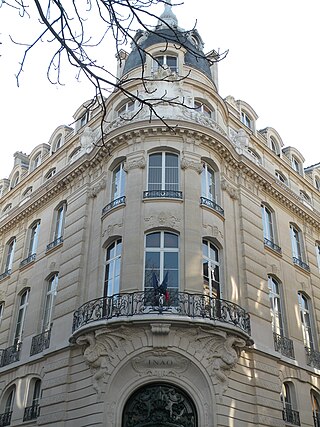
In France, the appellation d'origine contrôlée(AOC) is a label that identifies an agricultural product whose stages of production and processing are carried out in a defined geographical area – the terroir – and using recognized and traditional know-how. The specificity of an AOC product is determined by the combination of a physical and biological environment with established production techniques transmitted within a human community. Together, these give the product its distinctive qualities.

Montepulciano is a medieval and Renaissance hill town and comune in the Italian province of Siena in southern Tuscany. It sits high on a 605-metre (1,985 ft) limestone ridge, 13 kilometres (8 mi) east of Pienza, 70 kilometres (43 mi) southeast of Siena, 124 kilometres (77 mi) southeast of Florence, and 186 kilometres (116 mi) north of Rome by car.
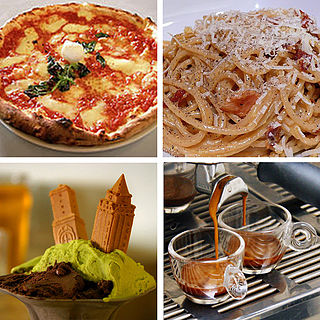
Italian cuisine is a Mediterranean cuisine consisting of the ingredients, recipes and cooking techniques developed in Italy since Roman times and later spread around the world together with waves of Italian diaspora. Some of these foods were imported from other cultures. Significant changes occurred with the colonization of the Americas and the introduction of potatoes, tomatoes, capsicums, maize and sugar beet—the latter introduced in quantity in the 18th century. It is one of the best-known and most appreciated gastronomies worldwide.

Monte Veronese is an Italian cheese made from cow's milk which is produced in the northern part of the province of Verona, more specifically in the Lessini Mountains or the Veronese prealps. Like Asiago it comes in two varieties, one fresh and one matured.
Sant'Angelo in Pontano is a comune (municipality) in the Province of Macerata in the Italian region Marche, located about 60 kilometres (37 mi) south of Ancona and about 25 kilometres (16 mi) south of Macerata. It stands in pleasant position with a panoramic view over the adjacent valleys of Ete Morto river and Tenna river.

In Italy, municipal police or Polizia Municipale, Polizia Locale are police of the various municipalities of Italy.
Sugoli is a dessert prepared with the must of red grapes, flour and sugar, cooked slowly and then left to cool. The sugoli can be served cool, like a pudding, or preserved in a jar like jam. It is a typical dessert in northern Italy.
The denominação de origem controlada is the system of protected designation of origin for fruit, wines, cheeses, butters, and other agricultural products from Portugal.
Prodotto agroalimentare tradizionale (PAT) is an official approval for traditional Italian regional food products similar to the protected geographical status of the European Union. A list of approved products is published by the Ministry of Agricultural, Food and Forestry Policies. It lists only products that do not qualify for pan-European approval, and as such PAT is only applicable within Italy.
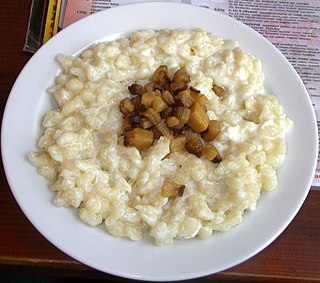
Traditional foods are foods and dishes that are passed on through generations or which have been consumed for many generations. Traditional foods and dishes are traditional in nature, and may have a historic precedent in a national dish, regional cuisine or local cuisine. Traditional foods and beverages may be produced as homemade, by restaurants and small manufacturers, and by large food processing plant facilities.
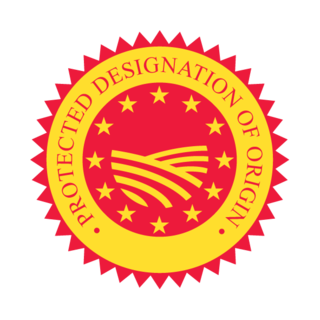
The protected designation of origin (PDO) is a type of geographical indication of the European Union aimed at preserving the designations of origin of food-related products. The designation was created in 1992 and its main purpose is to designate products that have been produced, processed and developed in a specific geographical area, using the recognized know-how of local producers and ingredients from the region concerned.

Mondeghili, also known as mondeghini), are meatballs typical of Milanese cuisine.

Italian Sounding is the marketing phenomenon consisting of words and images, colour combinations, and geographical references for brands that are evocative of Italy to promote and market agri-food products that have nothing to do with Italian cuisine. The phenomenon is described by the Office of the Ministry of Economic Development (MISE) called Directorate General for the Protection of Industrial Property – Italian Patent and Trademark Office (DGTPI-UIBM).
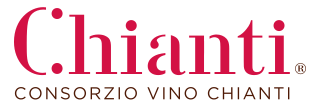
The Chianti Wine Consortium is a self-governing association of winegrowers operating in Tuscany, Italy. It was founded in Florence in 1927 with the aim of ensure the quality and authenticity of Chianti wines, which have a long-standing tradition and recognition both in Italy and abroad. The Consorzio protects and promotes the interests of Chianti wine producers from the provinces of Florence, Siena, Arezzo, Pisa, Prato, and Pistoia.
References
- ↑ Roberto De Donno (2008). De.Co. Denominazioni Comunali - Sviluppo locale e Strumenti di Marketing Territoriale (in Italian). Veronelli editore.
- ↑ "Come si fa la De.Co" (in Italian). Retrieved 2 December 2021.
- ↑ "Città di Torino - Regolamento comunale n. 398" (in Italian). Retrieved 2 December 2021.
- ↑ "Legge regionale 27 luglio 2018, n. 11. REGISTRO REGIONALE DEI COMUNI CON PRODOTTI DE.CO" (in Italian). Retrieved 2 December 2021.
- ↑ "DE.CO. Distretto Reale di Stupinigi" (in Italian). Retrieved 2 December 2021.